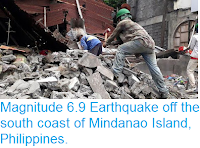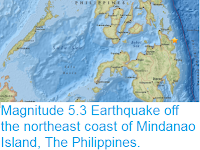The United States Geological Survey
recorded a Magnitude 7.0 Earthquake at a depth of 60.1 km about 83 km
off the southeast coast of Mindanao
Island, Philippines, slightly before 3.40 am local time on Saturday 29 December 2018 (slightly after 7.40 pm on Friday 28 December GMT). There are no reports of any damage or casualties associated with the event, but it was felt across Mindanao, as well as on the Indonesian islands of Sangihe and Talaud, and a tsunami alarm was briefly put in place, as the region is prone to such events.
The approximate location of the 29 December 2018 Mindanao Earthquake. USGS.
The geology of the central Philippines is Complex. The west of Mindanao
Island is located on the Banda (or Sunda) Microplate, and the east on
the Philippine Plate, which is being subducted beneath the Sunda (or
Banda) Microplate along the central part of the island. Immediately to
the east of the Island the Pacific Plate is being subducted along the
Philippine Trench, and passes beneath eastern Mindanao as it sinks into
the Earth. This is not a smooth process, an the plates constantly stick
together then break apart again as the pressure builds up, resulting in
Earthquakes.
Subduction beneath the Philippines. Yves Descatoire/Singapore Earth Observatory.
Earthquakes
along subductive margins are particularly prone to causing tsunamis,
since these often occur when the overlying plate has stuck to the
underlying plate, being pulled out of shape by its movement.. Eventually
the pressure builds up to far and the overlying plate snaps back,
causing an Earthquake and a tsunami.
Witness
accounts of Earthquakes can help geologists to understand these events,
and the structures that cause them. The international non-profit
organisation Earthquake Report is interested in hearing from people who may have felt this event; if you felt this quake then you can report it to Earthquake Report here.
See also...
Follow Sciency Thoughts on Facebook.









